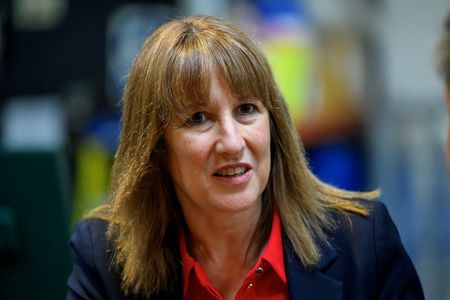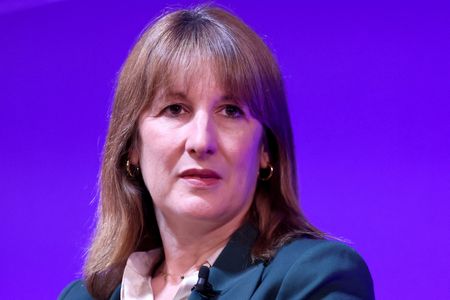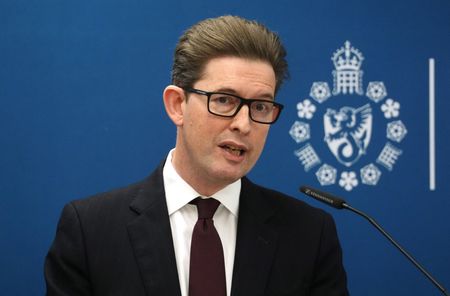By David Milliken
WASHINGTON (Reuters) -British finance minister Rachel Reeves said on Thursday she would like to have a bigger fiscal buffer to cope with volatile global markets but creating one in her budget next month would involve tough trade-offs.
Reeves has signalled that she will raise taxes and cut spending in her November 26 budget plan as she tries to stay on course to meet her fiscal targets and avoid upsetting investors who have already pushed up British borrowing costs sharply.
At her first budget last year, Reeves raised taxes by 40 billion pounds ($54 billion) but she is believed to be off course for her targets and to have lost all the 9.9 billion-pound buffer she gave herself, partly due to the rise in government bond yields.
‘YOU’VE GOT TO GET THE BALANCE RIGHT’
“Would I like more headroom? Of course I would. But that does come with trade-offs because more headroom requires more tax revenue or less spending on public services like the NHS,” Reeves told reporters in Washington where she is attending meetings of world finance officials.
“So you’ve got to get the balance right there,” Reeves told reporters.
On Wednesday, she said she was looking at tax and spending measures for next month’s budget.
Asked about the possibility of higher taxes on banks, Reeves said she wanted to ensure that Britain was “a great place to do business” and she highlighted recent investments by U.S. financial firms.
“It’s not all about tax, but I do want to have a competitive environment for all businesses in Britain,” she said, adding that she did not dispute industry assessments that British taxes on financial services were relatively high.
“Of course, though, we do want to make sure that everyone pays their fair share of taxes, and you’ve got to get the balance right there,” she added, repeating a previous comment that she did not plan to introduce a new wealth tax.
“I want Britain to be a great place for talent, for entrepreneurs, for successful individuals to come, and that requires getting the balance right,” Reeves said.
“But I do think that those with the broadest shoulders should pay their fair share of tax, and you can see that through my actions last year at the budget,” she said.
Reeves also said she was seeking ways to hold only one major fiscal event a year, something which would reduce the frequency of speculation about tax and spending changes that can crimp investment by businesses and consumption by households.
She said she would discuss with International Monetary Fund boss Kristalina Georgieva possible changes to the way that Britain’s independent budget watchdog, the Office for Budget Responsibility, publishes its forecasts, including its judgement on whether the government is set to meet its fiscal targets.
“With the forecasts as they are at the moment it makes it hard just to have one major fiscal event a year, and so we welcome the contribution of the IMF and others into how you can help make that a reality,” Reeves said.
The IMF said on Wednesday that Britain should not reduce the frequency of its twice-yearly economic forecasts, but the assessment of compliance against budget rules should only take place once a year.
($1 = 0.7443 pounds)
(Reporting by David Milliken in Washington. Writing by William James. Editing by William Schomberg and Mark Potter)











